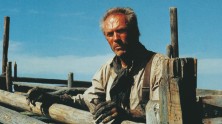
Clint Eastwood:
An American Master
This year marked the seventieth birthday of one of the iconic figures of contemporary cinema: actor-director Clint Eastwood. It was nearly thirty years ago that Eastwood began his work on the other side of the camera, coming of age as a filmmaker with a generation of auteurs who would define the New Hollywood. Eastwood’s oeuvre, however, represents a unique achievement among contemporary directors, for virtually alone he conjoined the legacy of Hollywood professionalism with the less hierarchical terrain of independent (although studio-financed) production. In his work we find vestiges of the real golden age of American cinema—traces of Walsh and Ford, Mann and Hawks, Siegel and Peckinpah. He is also the last great practitioner of the western, a most accomplished maker of action films, and—like Howard Hawks—a surprisingly adept director of comedy. While he remains a superstar in the film business, his legacy may well emerge less from his trademark "make my day" glare than from his quiet mastery of the codes of classical American cinema.













